Trump Water Rule ‘Ignores Science’
Air Date: Week of January 31, 2020
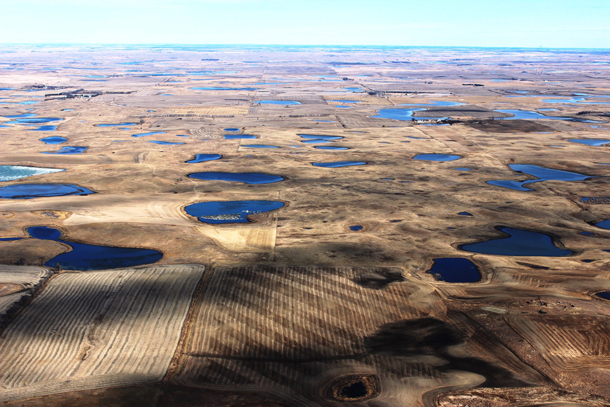
The Prairie Pothole Region of the United States and Canada is where over half of North America's waterfowl nest. This area is referred to as the "Duck Factory". (Photo: Krista Lundgren, USFWS)
The Trump Administration’s new water rule defines “waters of the United States” in a way that will result in far less protection for our rivers and wetlands. Critics of the new rule, including EPA’s own Science Advisory Board, say it has no grounding in basic watershed science. Kyla Bennett, the Science Policy Advisor for PEER, talks with Host Bobby Bascomb about why she believes this rule is devastating for watershed health.
Transcript
BASCOMB: It’s Living on Earth, I’m Bobby Bascomb.
When it comes to environmental protection, President Trump frequently emphasizes the importance of clean air and water.
PRESIDENT TRUMP: From day one, my administration has made it a top priority to ensure that America has among the very cleanest air and cleanest water on the planet. We want the cleanest air. We want crystal clean water. And that’s what we’re doing, and that’s what we’re working on so hard.
BASCOMB: Despite the President’s pledge to clean up American waterways, his Administration recently released a plan to dramatically reduce protections for many of the nation’s rivers and streams and roughly half our wetlands. That move is despite the recommendations of the Environmental Protection Agency’s own Science Advisory Board, which found the new clean water rule quote “neglects established science” by “failing to acknowledge watershed systems”. For more I’m joined now by Kyla Bennett. She is the Science Policy Advisor for PEER, Public Employees for Environmental Responsibility. Welcome to Living on Earth!
BENNETT: Thank you so much for having me.
BASCOMB: So how will the Navigable Waters Protection Rule proposed by the Trump administration change the way we protect our waterways?
BENNETT: Well, first of all, I'd like to point out that the name is an oxymoron, because it's not going to protect navigable waters or any other waters for that matter. What the Trump administration has done is they have removed protections from all ephemeral streams across the country, and all what they call geographically isolated wetlands. But unfortunately, because they ignored all the science, what they don't tell us is that both the ephemeral streams and these geographically isolated wetlands are indeed connected to downstream waters and they affect them greatly. So what's going to happen is if they allow the pollution of or filling of these streams and wetlands, we are going to have a lot of pollution downstream in the truly navigable waters and the more permanent waters and wetlands. If you look in New Mexico, for example, the Santa Fe River is ephemeral in places. I mean, that's a tributary to the Rio Grande. And it's a big river. But because it's so dry out there, and because it's so hot, there's a lot of evapo-transpiration, that water is pumped out of the river. And about 40% of Santa Fe's water supply comes from the Santa Fe River. But now the portions of it that are ephemeral will no longer be protected, and people can dump anything into it. And that's drinking water.
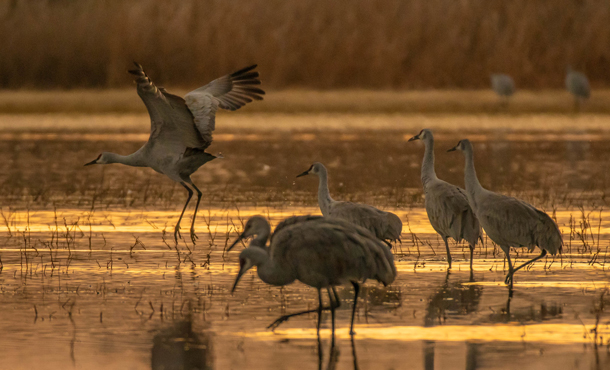
Wetlands provide critical migratory bird habitat for species like sandhill cranes, seen here enjoying Bosque del Apache National Wildlife Refuge in New Mexico. (Photo: sunrisesoup, Flickr, CC BY-NC-ND 2.0)
BASCOMB: And from what I understand this rollback goes beyond just the regulations that the Obama administration put in place, but actually goes back to 1972 when the Clean Water Act --
BENNETT: Correct.
BASCOMB: -- was initially passed. I mean, this is the biggest rollback in all that time, is that right?
BENNETT: It is. And I truly believe that this is probably the most harmful thing that this administration has done environmentally, it's going to have lasting and irreversible impacts if it doesn't get stopped. So this is really, really devastating news for the entire country. Because, especially with climate change, which, contrary to what this administration believes, it's here, it's real. It's causing more flooding, it's causing more droughts in some areas of the country. And this rule will exacerbate the impacts of climate change. So it will increase flooding in those areas that are getting wetter, and it will reduce protection for drinking water, not to mention fish and wildlife habitat, in those areas that are drier.
BASCOMB: Well, why did the Obama administration feel it was necessary to create the Clean Water Rule in the first place?
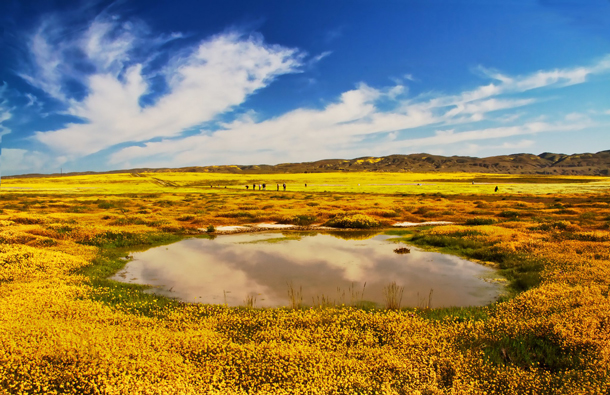
A vernal pool surrounded by a riot of wildflowers at California’s Carrizo Plain National Monument. Vernal pools are by definition ephemeral ponds that may be completely dry through most of the summer and fall, yet they provide critical habitat for amphibians and other life. (Photo: Mikaku, Flickr, CC BY-NC-ND 2.0)
BENNETT: Unfortunately, the Clean Water Act is a little fuzzy on how the regulators are supposed to restore and maintain the biological, physical, and chemical integrity of the nation's waters. And it has been litigated extensively. I freely admit that it has been confusing. And the reason the Obama administration came out with the 2015 Clean Water Rule was to try to clear up some of that confusion because the Supreme Court had a couple of cases that led to some pretty confusing things. People didn't know what was going on. So it was hard for the regulators, it was hard for the regulated public. And the 2015 Clean Water Rule made it easier. But it also happened to expand jurisdiction a tiny bit in some parts of the country. And that really made a lot of businesses and farmers angry.
BASCOMB: But from what I understand there were quite a few exceptions in that rule put forth by the Obama administration.
BENNETT: Oh, absolutely. And particularly for farmers. You know, it's kind of ironic that farmers are so against the new definition in 2015 and so supportive of this new Trump definition, because farming was one of the exemptions. If you had an active farm, you could do whatever you wanted, basically, to continue farming that property. There were no permits necessary, no mitigation necessary. The issue was if you wanted to create new farmland out of existing natural wetlands, then you needed a permit. And they didn't want to bother to do that. And so that's been the problem. They've always been exempt, farmers have always been exempt for doing normal agricultural activities. But they were not exempt if they were going to convert wetlands into cropland.
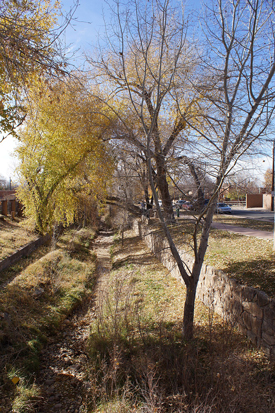
The Santa Fe River runs dry part of the year along some of its length, including where it is channeled through the city of Santa Fe, New Mexico. (Photo: Chris English, Wikimedia Commons, CC BY-SA 3.0)
BASCOMB: So you mentioned that farmers and agriculturalists were in favor of this new rule. But what other industries stand to benefit?
BENNETT: The National Home Builders Association has been very supportive of this new rule. And also a lot of the cattle farmers like the National Cattlemen's Association, I think it's called have been very supportive of it. And then also oil and gas drilling. Even pipelines, because if you think about it, like the Dakota pipeline or Keystone, they had to cross a lot of ephemeral streams to put those pipelines in and now they'll no longer need federal permits to do so.
BASCOMB: And President Trump was, of course, a developer and owns several golf courses. How likely is it, do you think, that he was hampered in some of his previous work by this rule?
BENNETT: Oh, he absolutely was he absolutely had to apply for permits for some of his buildings and golf courses. People stand to make a lot of money out of being able to develop in areas that they previously weren't allowed to develop in.
BASCOMB: What about state and local laws? I mean, surely those will still be in place.
BENNETT: Yes, but unfortunately, only about half of the states have state laws. So there are states like Texas that have no protection outside of federal law for wetlands and waters. And then there are states like New York, for example, which, New York only regulates wetlands that are greater than 12.4 acres in size. So states that have no protection or have weak laws will suffer the most. The reason we need federal laws for things like clean water or clean air or endangered species is that water, air and wildlife do not respect political boundaries. So what happens upstream in one state can really mess up a state downstream. So if you leave it up to the states, there are going to be states downstream of states that don't care who are going to get nailed by this, even if they are trying to do the best to protect their own waters. This is why we have federal environmental laws, and the Trump administration seems to have forgotten that.
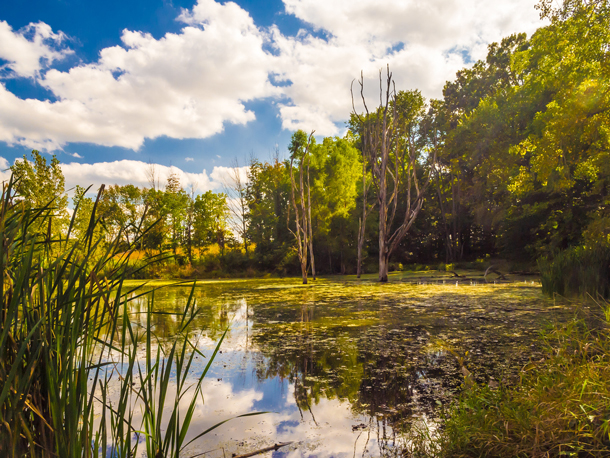
Wetlands provide a buffer during floods as well as drought, and they purify water that moves through them. (Photo: Dave Cornwell, Flickr, CC BY-NC-ND 2.0)
BASCOMB: Well, your organization, PEER, has requested that the EPA Inspector General conduct an inquiry, what's the status of that request?
BENNETT: So they have received it, we sent it to both the Inspector General and also the Scientific Integrity Officer. The status is that they said they're going to look into it. But I am afraid that this will get swept under the rug. We're asking for a congressional hearing. People need to know what was done. You know, EPA claims that the regions where all the experts are, the 10 regions of EPA have scientists and lawyers who are specialists in wetland science and wetlands law. They claim that these 10 regions were involved in the drafting of this rule. But yet the regions do not appear to have received the final rule until the day it was published just last week. They didn't see the language of the rule until the rest of us did. So to me, that does not sound like they were involved.
BASCOMB: Well, you used to work for the EPA, what are you hearing from former colleagues and current EPA employees about this rollback?
BENNETT: They're horrified as evidenced by our IG complaint and our complaint to the Scientific Integrity Officer, it was signed on by about 45. And I still have people calling me asking if they can sign on. And those are both former EPA people, including three Regional Administrators, and also current employees who signed on anonymously. They are absolutely horrified. And I want everybody to know that the career people at EPA across the country and at headquarters, the non-political appointees, are doing everything they can to try to show the public what is really going on there. And I think we all have to respect them and applaud them for their courage. It's not easy being a whistleblower. It's not easy being an environmentalist under this administration, and they all deserve our respect and support.
BASCOMB: Kyla Bennett is the Science Policy Advisor for PEER, Public Employees for Environmental Responsibility. Thank you so much for taking this time with me, Kyla.
BENNETT: Thank you so much for having me and for talking about this important topic.
BASCOMB: We reached out to EPA for comment and they sent a statement that reads in part, “The agencies’ definition of ‘waters of the United States’ is informed by science, but science cannot dictate where to draw the line between federal and state or tribal waters.” You can find the full statement on the Living on Earth website, loe dot org.
EPA statement on the Navigable Waters Protection Rule, attributable to an EPA Spokesperson:
"In the Clean Water Act, Congress gave explicit direction to protect “navigable waters.” The Navigable Waters Protection Rule regulates these waters and the core tributary system that provides perennial or intermittent flow to them. The agencies’ definition of “waters of the United States” is informed by science, but science cannot dictate where to draw the line between federal and state or tribal waters, as those are legal distinctions established within the overall framework and construct of the Clean Water Act.
The legal rationale for the Navigable Waters Protection Rule is clearly articulated in the final rule preamble. As described in the preamble, the final rule is primarily guided by the statutory authority delegated by Congress under the Clean Water Act and the legal precedent set by key Supreme Court cases. The agencies are precluded from exceeding their delegated authorities to achieve specific policy, scientific or other outcomes."
Links
EPA.gov | Final Rule: The Navigable Waters Protection Rule
Read the PEER Scientific Integrity Complaint about the Trump water rule
Read the EPA Science Advisory Board draft commentary on the rule
NYTimes | “Trump Removes Pollution Controls on Streams and Wetlands”
Living on Earth wants to hear from you!
Living on Earth
62 Calef Highway, Suite 212
Lee, NH 03861
Telephone: 617-287-4121
E-mail: comments@loe.org
Newsletter [Click here]
Donate to Living on Earth!
Living on Earth is an independent media program and relies entirely on contributions from listeners and institutions supporting public service. Please donate now to preserve an independent environmental voice.
NewsletterLiving on Earth offers a weekly delivery of the show's rundown to your mailbox. Sign up for our newsletter today!
 Sailors For The Sea: Be the change you want to sea.
Sailors For The Sea: Be the change you want to sea.
 The Grantham Foundation for the Protection of the Environment: Committed to protecting and improving the health of the global environment.
The Grantham Foundation for the Protection of the Environment: Committed to protecting and improving the health of the global environment.
 Contribute to Living on Earth and receive, as our gift to you, an archival print of one of Mark Seth Lender's extraordinary wildlife photographs. Follow the link to see Mark's current collection of photographs.
Contribute to Living on Earth and receive, as our gift to you, an archival print of one of Mark Seth Lender's extraordinary wildlife photographs. Follow the link to see Mark's current collection of photographs.
 Buy a signed copy of Mark Seth Lender's book Smeagull the Seagull & support Living on Earth
Buy a signed copy of Mark Seth Lender's book Smeagull the Seagull & support Living on Earth

